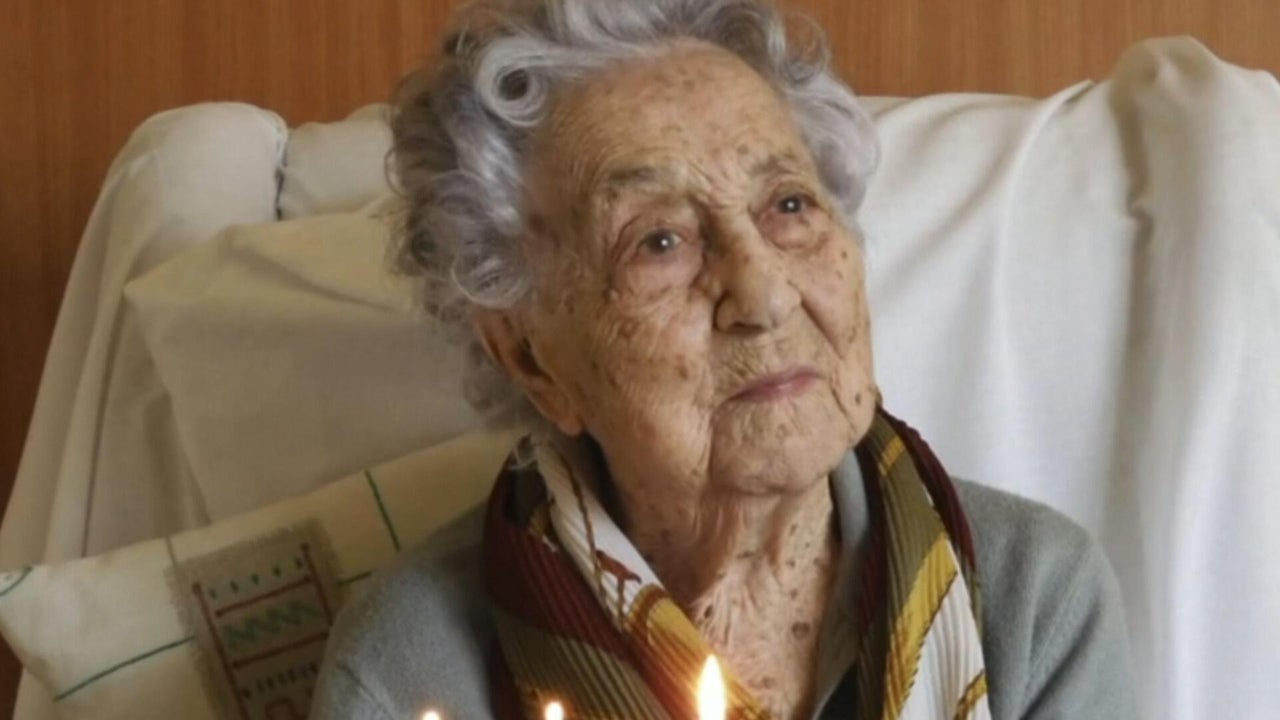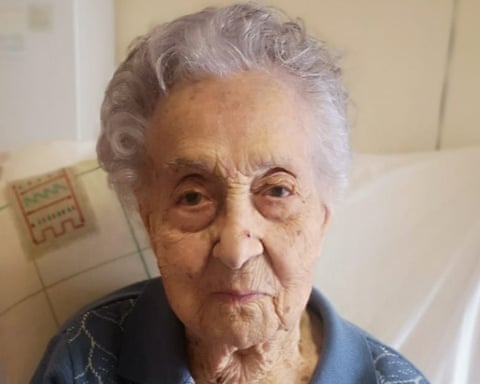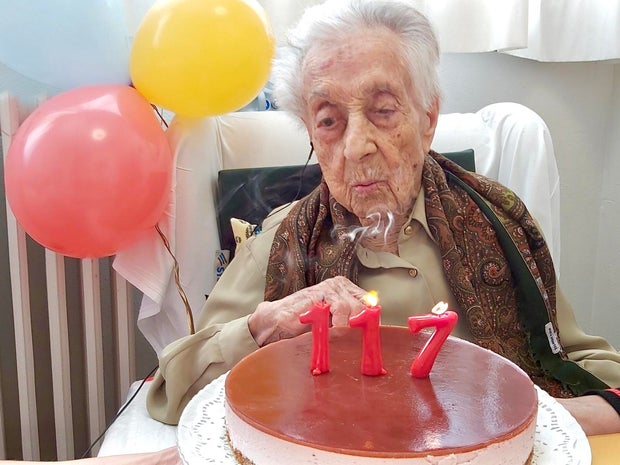
She lived to be the world’s oldest person. A new study credits genetic variants — and maybe her yogurt habit.

When Maria Branyas Morera died last year at 117 years and 168 days old, she was the oldest known person in the world. Before she died, she asked doctors to study her.
Dr. Manel Esteller, chairman of Genetics at the University of Barcelona’s School of Medicine, spent three years analyzing Branyas’ health. A study, published online Wednesday, by Esteller and a cohort of colleagues found that a mix of factors contributed to Branyas’ longevity.
“The conclusion is that the clues for extreme longevity are a mix between what we inherited from our parents and what we do in our lives,” Esteller said. “And this mix, the percentage depends, but it can be … half and half.”
Branyas “had very good genes that protect against many disorders, many genetic variants that nobody has seen before,” Esteller said. She also had “very good habits.” She didn’t smoke or drink alcohol, and had a diet rich in fish, olive oil and yogurt — eating three yogurts each day, according to Esteller.
The yogurt was plain without added sugar, which replenishes the gut with good bacteria, helping to combat inflammation, Esteller said.
Chronic inflammation is one of the main causes of aging and disease, he said.
“These are good bacteria that provide an advantage to humans,” Esteller added.
The study noted that “whether the dominance of the Bifidobacterium [beneficial gut bacteria] related genus is fully attributable or not to the yogurt diet cannot be completely confirmed since that would have required a longitudinal study with sample collection over several years. However, we believe that it is likely that a beneficial effect of yogurt ingestion via modulation of the gut ecosystem could have contributed to her well-being and advanced age.”
Branyas once posted on social media about her love for yogurt, saying it “gives life” — and hers was a long one. She was born in 1907 in San Francisco and had lived in Spain since she was 8. She survived two world wars and two pandemics, and had three children and 13 great-grandchildren.
In addition to living a long life, she also lived a healthy one — free of cancer, cardiovascular disease or dementia, according to Esteller.
The picture that emerges from studying Branyas “shows that extremely advanced age and poor health are not intrinsically linked and that both processes can be distinguished and dissected at the molecular level,” the study, published in Cell Reports Medicine, says.
Researchers said that to conduct the study, “samples from the subject were obtained from four different sources: total peripheral blood, saliva, urine, and stool at different times.”
It also noted some limitations, including that aging and extreme longevity “are probably highly individualized processes,” so “drawing broadly applicable conclusions from a single subject should be taken with caution.”
Supercentenarian gives scientists insight on secrets of healthy old age
Tests on Maria Branyas Morera, who was world’s oldest person before she died last year aged 117, gave doctors a trove of discoveries

The nonagenarian actor Dame Joan Collins may have been on to something when she declared “age is just a number”.
The deepest dive yet into the biology of a supercentenarian has revealed that even extreme old age can be reached without the brain necessarily faltering or the usual illnesses mounting up.
Doctors in Spain conducted a comprehensive suite of tests on Maria Branyas Morera, who was the world’s oldest person before she died at 117 years old last year.
They discovered that while her body showed clear signs of extreme old age, a number of biological factors protected her from the diseases that normally plague the final years of life.
“The common rule is that as we age we become sicker, but she was an exception and we wanted to understand why,” said Dr Manel Esteller at the Josep Carreras Leukaemia Research Institute in Barcelona. “For the first time, we’ve been able to separate being old from being sick.”
In the years before she died, Branyas invited doctors to study her to learn why she had reached such a ripe old age. Born in San Francisco in 1907, Branyas moved to Catalonia in 1915 and survived two world wars, the Spanish civil war and the Covid pandemic, recovering from the virus aged 113.
Esteller and his colleagues drew on blood, saliva, urine and stool samples collected a year before Branyas’s death to build a detailed picture of her biology. The tests delved into her genetics and the extent to which different genes were switched on and off; the varieties and levels of proteins in her blood, the breakdown products from reactions in her body and the diversity of microbes in her gut.
Among a trove of discoveries, they found that protective caps called telomeres on the ends of Branyas’s chromosomes were exceptionally short, a clear sign of old age in her cells. Her immune system also showed signs of old age, was prone to inflammation, and she had acquired mutations that lead to leukaemia.
But Branyas was seemingly well protected. Telomeres shorten whenever cells divide, and hers were so short they may have protected her from cancer by limiting the amount that cells continued to divide, Esteller said.
A close look at her DNA revealed gene variants that protected her heart and brain cells from disease and dementia. She had low levels of inflammation throughout her body, which reduced her risk of cancer and diabetes, and efficient cholesterol and fat metabolism. “These are all critical because they’re linked to diseases that are typical in older people and they kill you at the end,” Esteller said.
The team then turned to epigenetic clocks, which look at patterns of gene expression, to assess Branyas’s biological age. “She was at least 10 to 15 years younger [than her chronological age],” Esteller said. Her gut microbiome was also very young for her age with plenty of Bifidobacterium, which is also considered beneficial to health.
Her long life was not all down to genetics, however. Branyas was not overweight, ate a lot of yoghurt, and did not smoke or drink. She had a good social life with friends and family nearby. All surely helped, Esteller said.
He hopes the wealth of information will help scientists develop new treatments to keep people healthy in old age. “We can develop drugs to reproduce the effects of good genes,” he said. “Maria’s parents gave her very good genes, but we cannot choose our parents.”
Prof João Pedro de Magalhães at the University of Birmingham, said: “These outliers in longevity could provide insights into how to age more gracefully. If we could figure out which specific genes are associated with extreme human longevity and healthy old age it could provide clues about mechanisms for ageing as well as drugable targets to develop interventions that allow everyone to live longer, healthier lives.”





:max_bytes(150000):strip_icc():focal(999x0:1001x2)/Zach-Roloff-Post-Brain-Surgery-20230209_40-2000-0a38151705d74b75aabee6a08b7add33.jpg?w=1200&resize=1200,0&ssl=1)
































:max_bytes(150000):strip_icc():focal(1135x842:1137x844)/Minnesota-Shooting-012426-05-ec3dbff32cae4e7f89a85f645abb6249.jpg?w=1200&resize=1200,0&ssl=1)





